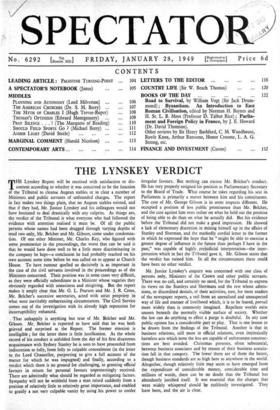THE LYNSKEY VERDICT
THE Lynskey Report will be received with satisfaction or dis- content according to whether it was conceived to be the function of the Tribunal to cleanse Augean stables or to clear a number of Ministers and public servants of unfounded charges. The report in fact makes two things plain, that no Augean stables existed, and that if they had, Mr. Justice Lynskey and his colleagues would not have hesitated to deal drastically with any culprits. As things are, the verdict of the Tribunal is what everyone who had followed the evidence with attention realised it must be. Of all the public persons whose names had been dragged through varying depths of mud two only, Mr. Belcher and Mr. Gibson, come under condemna- tion. Of one other Minister, Mr. Charles Key, who figured with some prominence in the proceedings, the worst that can be said is that he would have done well to be a little more discriminating in the company he kept—a conclusion he had probably reached on his own account some time before he was called on to appear at Church House. To have rumour quelled so decisively is as important in the case of the civil servants involved in the proceedings as of the Ministers concerned. Their position was in some cases very difficult, as they were officially subordinate to a Minister whose vagaries they obviously regarded with uneasiness and misgiving. But the report makes it amply clear that Mr. G. L. Pearson and Mr. J. R. Cross, Mr. Belcher's succesive secretaries, acted with strict propriety in what were inevitably embarrassing circumstances. The Civil Service comes out of the investigation with its already high reputation for incorruptibility enhanced.
That unhappily is anything but true of Mr. Belcher and Mr. Gibson. Mr. Belcher is reported to have said that he was both grieved and surprised at the Report. The former emotion is intelligible ; for the latter there is little justification. As the whole record of his conduct is unfolded from the day of his first disastrous acquaintance with Sydney Stanley he is seen to have proceeded from indiscretion to folly, from folly to culpable concealment (in the letter to the Lord Chancellor, purporting to give a full account of the matter for which he was impugned) and finally, according to a verdict which there is no ground for challenging, to granting official favours in return for personal favours unprotestingly received. There are admittedly what should be regarded as mitigating factors. Sympathy will not be withheld from a man raised suddenly from a position of relatively little to relatively great importance, and enabled to gratify a not very culpable vanity by using his power to confer irregular favours. But nothing can excuse Mr. Belcher's conduct. He has very properly resigned his position as Parliamentary Secretary to the Board of Trade. What course he takes regarding his seat in Parliament is primarily a matter between him and his constituents. The case of Mr. George Gibson is in some respects different. He occupied a position of less public prominence than Mr. Belcher, and the case against him rests rather on what he held out the promise of being able to do than on what he actually did. But his evidence before the Tribunal did not make a good impression. He showed a lack of elementary discretion in mixing himself up in the affairs of Stanley and Sherman, and the markedly cordial letter to the former in which he expressed the hope that he " might be able to exercise a greater degree of influence in the future than perhaps I have in the past," was capable of highly_ prehidicial interpretation—the inter- pretation which in fact the Tribunal gave it. Mr. Gibson states that the verdict has ruined him. In all the circumstances there could have been no other verdict.
Mr. Justice Lynskey's enquiry was concerned with one class of persons only, Ministers of the Crown and other public servants. There was no call, and certainly no need, for the Tribunal to express its views on the Stanleys and Shermans and the rest whose admis- sions, or discredited denials, of their activities, tore, for most readers of the newspaper reports, a veil from an unrealised and unsuspected way of life and manner of livelihood which, it is to be feared, prevail more widely than is commonly imagined. Repellent worlds exist unseen beneath the normally visible surface of society. Whether the law can do anything to effect a purge is doubtful. In any case public opinon has a considerable part to play. That is one lesson to be drawn from the findings of the Tribunal. Another is that in business relations, still more in official relations, even intrinsically harmless acts which none the less are capable of unfortunate construc- tions are best avoided. Christmas presents, often substantial, between business associates and by reason of their business associa- tion fall in that category. The fewer there are of them the better, though business standards are as high here as anywhere in the world. Altogether, though relatively little may seem to have emerged from the expenditure of considerable money, considerable time and millions of words, there can be no doubt that the Tribunal has abundantly justified itself. It was essential that the charges that were widely whispered should be ruthlessly investigated. They have been, and the air is clear.






































